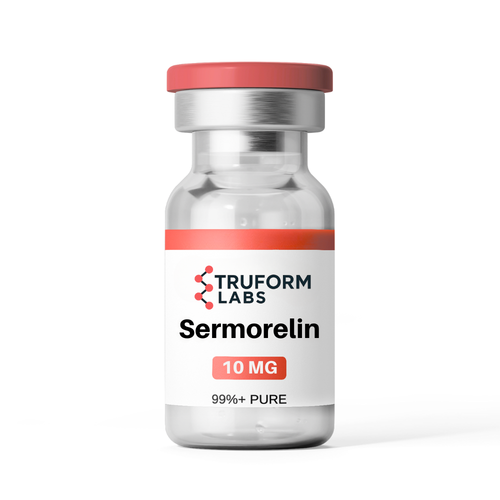Product Overview
Thymosin alpha-1 (Tα1) is a 28-amino acid peptide derived from prothymosin alpha, naturally occurring in the thymus, and is recognized for its immunomodulatory properties. Tα1 acts primarily by enhancing both innate and adaptive immune responses, notably through activation of Toll-like receptors (TLRs) on dendritic cells, T cells, B cells, macrophages, and natural killer cells, leading to increased cytokine production and immune cell maturation.[1-4] Its pleiotropic effects include modulation of inflammation, promotion of immune tolerance, and restoration of immune function in immunosuppressed states.[4-5]
Clinically, Tα1 (synthetic form: thymalfasin) is approved in several countries for the treatment of chronic hepatitis B and C, and as an immune enhancer in immunocompromised populations.[6-8] In hepatitis B, Tα1 monotherapy has demonstrated viral clearance rates superior to untreated controls and comparable to interferon alfa-2b, with a recommended dose of 1.6 mg (900 μg/m²) subcutaneously twice weekly.[8] For hepatitis C, combination therapy with interferon alfa-2b has shown improved rates of ALT normalization and viral RNA clearance compared to interferon alone.[8]
In oncology, Tα1 is used as an adjuvant in cancer therapy, particularly in hepatocellular carcinoma, non-small cell lung cancer, and melanoma. It enhances anti-tumor immunity, reduces chemotherapy-induced lymphopenia, and may synergize with immune checkpoint inhibitors to improve efficacy and reduce immune-related adverse events.[2][6][9-10] Tα1 has also shown benefit in severe infections and sepsis by restoring immune competence and reducing mortality in immunosuppressed patients.[6-7]
Tα1 is generally well tolerated, with the most common adverse effect being local injection site irritation.[8] Its short plasma half-life (~2 hours) necessitates frequent dosing, though long-acting formulations are under investigation.[11] Overall, Tα1 is a versatile immunomodulator with established roles in viral infections, cancer, and immune deficiency states, and ongoing research is expanding its therapeutic applications.[1-2][6-7][10]
1.Thymosin Α1 and Its Role in Viral Infectious Diseases: The Mechanism and Clinical Application.Tao N, Xu X, Ying Y, et al.Molecules (Basel, Switzerland). 2023;28(8):3539. doi:10.3390/molecules28083539.
2.Thymosin Α-1 in Cancer Therapy: Immunoregulation and Potential Applications.Wei Y, Zhang Y, Li P, Yan C, Wang L. International Immunopharmacology. 2023;117:109744. doi:10.1016/j.intimp.2023.109744.
3.Immune Modulation With Thymosin Alpha 1 Treatment.King R, Tuthill C.Vitamins and Hormones. 2016;102:151-78. doi:10.1016/bs.vh.2016.04.003.
4.Thymosin Alpha1: An Endogenous Regulator of Inflammation, Immunity, and Tolerance.Romani L, Bistoni F, Montagnoli C, et al.Annals of the New York Academy of Sciences. 2007;1112:326-38. doi:10.1196/annals.1415.002.
5.Jack of All Trades: Thymosin Α1 and Its Pleiotropy.Romani L, Moretti S, Fallarino F, et al.Annals of the New York Academy of Sciences. 2012;1269:1-6.doi:10.1111/j.1749-6632.2012.06716.x.
6.Thymosin Alpha 1 - Reimagine Its Broader Applications in the Immuno-Oncology Era.Mao L.International Immunopharmacology. 2023;117:109952. doi:10.1016/j.intimp.2023.109952.
7.From Lab to Bedside: Emerging Clinical Applications of Thymosin Alpha 1.Goldstein AL, Goldstein AL.Expert Opinion on Biological Therapy. 2009;9(5):593-608. doi:10.1517/14712590902911412.
8.Thymosin Alpha-1.Ancell CD, Phipps J, Young L.American Journal of Health-System Pharmacy : AJHP : Official Journal of the American Society of Health-System Pharmacists. 2001;58(10):879-85; quiz 886-8. doi:10.1093/ajhp/58.10.886.
9.Thymosin Α1 and Cancer: Action on Immune Effector and Tumor Target Cells.Garaci E, Pica F, Serafino A, et al.Annals of the New York Academy of Sciences. 2012;1269:26-33. doi:10.1111/j.1749-6632.2012.06697.x.
10.A Reappraisal of Thymosin Alpha1 in Cancer Therapy.Costantini C, Bellet MM, Pariano M, et al.Frontiers in Oncology. 2019;9:873. doi:10.3389/fonc.2019.00873.
11.PASylated Thymosin Α1: A Long-Acting Immunostimulatory Peptide for Applications in Oncology and Virology.Binder U, Skerra A.International Journal of Molecular Sciences. 2020;22(1):E124. doi:10.3390/ijms22010124.







